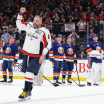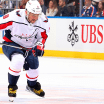October 26 vs. Tampa Bay Lightning at Amalie Arena
Time: 7 p.m.
TV: MNMT
Radio: 106.7 The Fan, Caps Radio 24/7
Washington Capitals (5-1-0)
Tampa Bay Lightning (4-3-0)
The Caps fly south for their final road game of October, a Saturday night date with the Lightning in Tampa. As it heads to The Sunshine State on Friday afternoon, Washington brings along a five-game winning streak, matching its longest winning run of the 2023-24 season.
Last season, the Caps won five straight games from Nov. 10-22, 2023. The last time Washington had a longer winning run was a seven-game spree from March 7-19, 2021. That seven-game streak in late winter of 2021 came in the midst of a longer 18-game stretch in which the Caps fashioned a 15-2-1 mark over what was essentially one third of that pandemic-abbreviated, 56-game season.
Most recently, the Caps swept a midweek set of home-and-home, back-to-back games with Metro Division rival Philadelphia. In winning the second of those games against the Flyers by a 6-3 count, the Caps got five assists from their back end on their first four goals of that game; the last two markers were empty-netters. Washington’s early season hot spell has been fueled by offense; the Caps’ rate of 4.33 goals per game ranks third in the NHL. And a big part of their offensive turnaround has been fueled by contributions from the defense.
Going into Friday night’s slate of NHL activity, the Caps are – along with Colorado, Tampa Bay, Winnipeg and the New York Rangers – one of just five NHL teams that is averaging three points per game or better from its back end. Last season, the Caps finished 30th in aggregate offense from its blueline corps with 135 points in 82 games (1.65 points per game). Their total of 20 goals from the defense was second-to-last; only Chicago (19) had fewer.
“I like what they’re bringing offensively from the back end,” says Caps’ coach Spencer Carbery. “Some of the things that we’ve changed systematically are helping, and then also we’re building a real connection between our forwards and [defensemen], which has helped a lot, too. There’s a trust there. It’s hard to explain, but essentially there’s a trust level there of, ‘We’re going to you pucks and we’re going to look after you, and we’re going to protect you.’ And then there’s a responsibility of our [defense] to do the exact same thing in return, and that’s where I think, in the offensive zone – and I could go into this for a long time – forwards want to produce offensively.
“So when they get a puck and they give it back to the [defense] up top at the blue line, they're giving the [defense] the puck, and now they’re expecting a good decision or productive puck, right? If you don’t have trust there, forwards will be less likely – I’m not going to say they won’t, because no one in the National Hockey League does that – but they will be less likely to give pucks back, low to high, because there’s not a trust and a confidence that that puck will end up in a good spot, whether it’s a shot, whether it’s just released back, whether it’s a [defense] to [defense pass], whatever the decision is.
“I feel like we’ve established that [trust], worked on it. It takes time, and it takes practice, and it takes building that. But I feel like our forwards and [defense] are very, very connected with what we’re trying to do offensively, especially in the offensive zone.”
Along those lines, the forwards are trusting the defense to make good decisions and good placements with those pucks in the offensive zone, but it’s a two-way street. The defensemen want forwards to be in good spots to present their sticks for tip opportunities, and to generate good and smart traffic in front, where the blueliners can create scoring opportunities from up top. They’ve got to be able to get pucks through the traffic to create the tip and rebound chances that have produced a number of Washington’s goals in the first half dozen games of the season.
“I think tactically, we’ve changed a little bit,” says Carlson. “And I think confidence matters in big spots. Guys are making really nice plays, and really nice plays to score goals in this League. But there’s been a lot of more systematic stuff – and it’s not rocket science – and I feel like we’re getting to the net a lot more, and guys are hanging around there, and good things happen.”
Carlson’s point on confidence is well taken; the Caps’ early season shooting pct. of 15.2% is second only to that of Vegas (15.43). Washington is finishing its chances, which is another significant change from a similar juncture of last season. Six games into the 2023-24 season, Washington’s 7.41% shooting pct. ranked 30th in the NHL. Over a six-month, 82-game season, regression will make its presence felt eventually.
“For guys that score, for a few to go in, you feel good about yourself,” says Carbery. “Now, all of a sudden, you have a little bit of swagger, and I feel like a bunch of our guys are playing really, really confident right now. And you can see that in a bunch of different forms.
“Like, you can tell Connor McMichael is feeling it offensively; he’s made a few really high-end plays, finishes on a breakaway, looks good. [Andrew] Mangiapane [Tuesday] night, shorthanded, goes down, looks good, rips it in the back of the net. Tom Wilson gets a puck in the slot, and you feel like that puck is going in the net. And when you have a bunch of players that are feeling confident and scoring, that can snowball, and I feel like that’s what’s happened to us early in the year.
“Now, probably at some point, it’s going to go the other way, where guys are like, ‘I feel like there is a lid over the top of the net; they’re just not going in for us.’ So you ride it while they’re going in for you, and when it dries up, we’re going to have to find different ways to score and to try to get other guys going. But you try to keep that swagger and that confidence going as long as you can.”
For Tampa Bay, Saturday’s game is the middle match of a three-game homestand. In the opener on Thursday night, the Lightning was unable to cool off the Minnesota Wild, who skated off with a 4-2 victory to improve to 5-0-2 on the season.
The Bolts were able to make Minnesota play without a lead for the first time this season; Tampa Bay grabbed a 2-1 lead on Nikita Kucherov’s eighth goal of the season midway through the second period. But the Wild pulled even late in the second, and it took the lead for good on Matt Boldy’s power-play goal in the first minute of the final frame.
After the Caps depart Tampa on Saturday night, the Lightning will host the Nashville Predators in the finale of the homestand on Monday. That one should make for an emotional night locally; it marks the return of longtime Lightning captain and star Steven Stamkos. Stamkos signed a multi-year deal with the Preds over the summer after spending the first 16 seasons of his career with Tampa Bay.



















